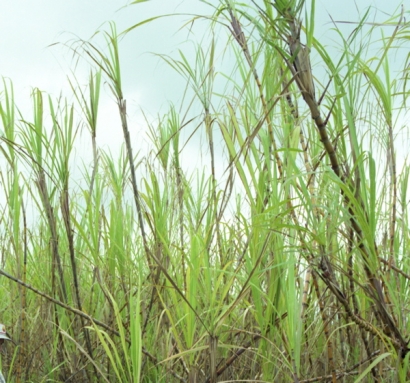
“The U.S. continues to enjoy cheap, abundant energy but more than 80 percent of which is derived from natural gas, coal, and petroleum,” said ROGUE Director Stephen Long, an Ikenberry Endowed Chair at Illinois. “Heavy, diesel-powered semitrailers and the aviation industry desire other options, but electric batteries are not feasible, and current biofuel crops cannot meet demands for biodiesel and biojet fuel.”
ROGUE will engineer energycane, a bioenergy crop derived from sugarcane, and Miscanthus to produce the oil that is used to create biodiesel and biojet fuel. Their work is guided by computer models, which project that these crops can achieve 20 percent oil content in the plant—a dramatic increase from natural levels of less than a tenth of one percent.
Previous work, funded by the DOE Advanced Research Projects Agency-Energy achieved 8 percent oil accumulation. It is hoped ROGUE will further increase oil production and target oil accumulation in the stem where it can be accessed more easily with ROGUE’s patented extraction technologies.
ROGUE will also work to improve the efficiency with which these crops can turn the sun’s energy into plant energy to fuel their biological oil production. Improving these crops’ photosynthetic efficiency will ensure that the production of energy-dense oil will not lower yields or suppress plant defenses. It will also help the plant conserve limited resources such as water and nitrogen, particularly under stress.
ROGUE will translate its bioenergy and sustainability discoveries into energycane and Miscanthus using synthetic biology, which applies engineering principles to optimize and speed up the design of biological systems. The project will also develop energycane to be more cold-tolerant to expand its growing region and extend its growing season.
“Our crop technologies could thrive on 235 million acres, turning untold underutilized, marginal acreage into sustainable sources of bio-oil,” Long said.
Energycane will be evaluated at Florida and Mississippi, and Miscanthus will be tested at Illinois. In tandem, the project will continue to perfect and evaluate its patented method to separate oil from biomass and its processing technologies.
ROGUE is a collaboration of researchers from Illinois as well as Brookhaven National Lab, University of Florida, and Mississippi State University, with support from the DOE Office of Science (Office of Biological and Environmental Research).

